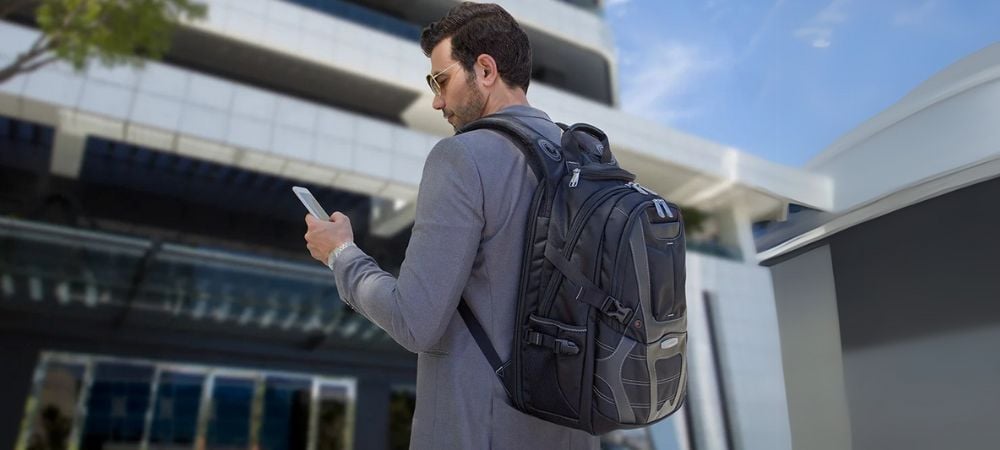Bookbag vs. Backpack: Key Differences to Suit Your Needs
Imagine starting your day, whether you’re heading to work, school, or an outdoor adventure, and there is just one thing you cannot leave without: your bag. But then, it begs the question: bookbag vs. backpack—how do you decide which one to carry? Though both are important tools to carry whatever items you may need, their differences in design, functionality, and purpose can make a big difference.
But this will not be a decision based on looks alone; comfort, practicality, and suitability of the bag for your needs come into play. In this in-depth post, we look at the difference between a book bag and a backpack, explore each option's pros and cons, and ultimately help you make a choice depending on your lifestyle.
Bookbag vs Backpack


Before we dive into the differences, let's first get a sense of what each bag is and what it's designed for.
Bookbag:
A book bag is just a small-sized bag that is generally carried on one's hands or over the shoulder. The major stuff one could take in this would be books, documents, and light stuff. Ordinarily, bookbags are used while dealing with lighter stuff that has to be moved, and in situations involving professionals or casual environments.
What is a bookbag used for?
Bookbags are meant for carrying items such as notebooks, tablets, or even small laptops. They are perfect in situations that call for style and formality rather than capacity and comfort.
Is a bookbag the same as a backpack?
No, even though they are both a kind of bag for carrying, bookbags are less spacious and usually lack the ergonomic design of a backpack.
Backpack:
A backpack, however, is designed to be carried on your back with two shoulder straps. They come in different sizes and styles, offering more storage space and comfort for carrying heavier loads. They are often equipped with compartments that allow you to organize your backpack efficiently.
Backpacks are versatile and functional carriers that have found their way into the daily use of students, travelers, and outdoor enthusiasts.
Difference between bookbag and backpack
The difference between a bookbag and a backpack is not merely in how they are carried. Let us explore in detail their designs, features, and functionality.
- Design and Structure:
Bookbag: Bookbags are small, usually made with one main compartment, and as minimalistic as possible; to be carried on with either hands or one strap.
Backpack: There is a facility provided for the carrying of backpacks using two straps on the back so as to evenly distribute the weight applied. Most of them have divided compartments and as such, the items placed in the compartments can easily be organized. - Comfort and Ergonomics:
Bookbag: Carrying a bookbag can get exhausting, sometimes especially when this is done for long durations. Its design is not such that it would distribute the weight evenly, and that could cause discomfort when heavier loads are being carried.
Backpack: The backpacks are much comfier to carry heavier items in with padded straps and ergonomic designs. They reduce the strain on your shoulder and back, hence being a good choice for longer days. - Capacity and Storage:
Bookbag: Bookbags have limited carrying capacity and thus are ideal for light loads only. They work great if you just want to carry two or three books, a small laptop, or documents, as they aren't meant to bear heavy luggage.
Backpack: These vary in size from small daypacks to large-sized travel bags. These can accommodate almost anything that one may need, from books and clothes to even camping gear, due to their spacious compartments. - Durability and Materials:
Bookbag: Bookbags are made of light material, including canvas or fake leather. They are made to be fashionable rather than to last.
Backpack: Heavy-duty backpacks are made for durability and could last a lifetime. Many of them are made of such materials as nylon, polyester, or leather, which make them more suitable for rough handling. - Style and Aesthetic:
Bookbag: Most of the bookbags are made in sleek, formal, or even retro styles. This type is commonly used by business people and anybody who wants to look decent and presentable.
Backpack: The designs are versatile, ranging from casual and sporty to professional. They're a better choice for those seeking functionality with style.
Comparison Table: Bookbag vs. Backpack
| Feature | Bookbag | Backpack |
| Design | Compact, single strap or handheld | Ergonomic, dual shoulder straps |
| Comfort | Less comfortable for heavy or prolonged use | Distributes weight evenly; comfortable for long use |
| Capacity | Limited storage; suitable for light loads | Spacious, with multiple compartments for organization |
| Durability | Lightweight materials; less rugged | Durable materials; suitable for heavy-duty use |
| Style | Sleek, formal, or vintage designs | Versatile; ranges from casual to professional |
| Common Use | Professionals, casual errands | Students, travelers, outdoor activities |
Factors to Consider When Choosing


Now that you understand the basics, let's look at the key factors that can help you decide which is better: bookbag or backpack for your needs:
- Purpose:
If you are one of those professionals who have to carry only a laptop and a few documents, the bookbag could be your best bet.
For students, travelers, or people who carry heavier loads, a backpack is more practical. - Comfort:
If you're going to be carrying your bag for extended periods, a backpack is an ergonomic winner.
Bookbags, although stylish, can be uncomfortable if too much is packed into them. - Style Preferences:
Bookbags are sleek and formal, therefore they will be perfect for offices or meetings.
Backpacks are more versatile for casual and professional use. - Storage Needs:
Consider the size of backpack. If you need many compartments and large storage, you would prefer a backpack.
Pros and Cons:
Here's a detailed comparison that will help you decide:
Bookbag:
Pros:
➤Lightweight and easy to handle.
➤Stylish, formal.
➤Compact and minimalist
Cons:
➤Limited capacity.
➤Not comfortable for long carrying.
Backpack:
Pros:
➤Roomy and multifunctional.
➤Comfortable to carry heavy weights.
➤Ideal for organizing things.
Cons:
➤Bulkier compared to a book bag.
➤Can come across as too casual for formal use.
Common Use Cases
Let's dive into when to wear a bookbag versus a backpack:
Bookbag:
➤Professionals with documents or a laptop.
➤Light errands or casual outings.
➤Those prioritizing style over capacity.
Backpack:
➤Students carrying books and supplies.
➤Travelers or commuters require space and organization.
➤Those who enjoy the outdoors and need strong, heavy-duty storage.
Conclusion
Everything comes to where your needs and preferences lie, thus choosing between the two. Though, on one thought, a book bag can be quite ideal for a person who gives more importance to style, light, and formal; when it comes to space, comfort, and versatility, a backpack may serve you better for your lifestyle.
The difference between a bookbag and a backpack is important to understand in order to make the right choice. Consider your daily routine, storage needs, and personal preferences to find the perfect bag for you.
Be it off to the office or off on an adventure, there is a bag for that. So, the ultimate question: bookbag or backpack? Browse Everki through your options today and choose wisely for your lifestyle.
FAQS
What are some advantages of carrying a bookbag?
Bookbags are ideal for professionals or any other individual in need of a sleek, no-fuss option when carrying minimal items.
Why use a backpack rather than a bookbag?
Actually, a backpack is much better in terms of not only storage or comfort but also durability, which applies to most tasks and everyday needs most efficiently.
Which is better for carrying heavy books, a bookbag or a backpack?
Heavy books are better handled using backpacks, as they distribute the weight appropriately on your shoulder or back area because of the way other book bags do it, it puts unevenness across your body that may cause unease.
Why does my bookbag hurt my shoulder?
Bookbags usually strain one shoulder because they don't distribute weight evenly. This can be avoided by using a backpack with padded straps.


